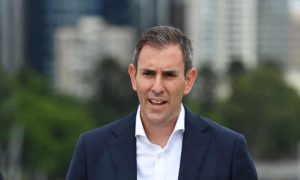Shadow treasurer moves to make Labor policy crystal clear after Coalition seizes on ambiguity in Anthony Albanese’s comments

Labor has no plans to increase taxes on Australians and will look to lift foreign aid if elected in May, the shadow treasurer, Jim Chalmers, has said.
The senior frontbencher said on Sunday that federal Labor’s only tax proposal was to crack down on multinational tax avoidance.
Chalmers’ clear statement was an attempt to clarify the Labor party’s position after the opposition leader, Anthony Albanese, failed to rule out new taxes last week.
Labor is also under pressure from the Coalition to cost its promise to fund pay increases in aged care as the treasurer, Josh Frydenberg, revealed on Sunday the government may only part-fund increases in the private sector.
On Friday, Albanese said Labor would announce a policy on “multinational tax evasion” but would not take forward any tax measures proposed before the 2019 election – which the Coalitionargued didn’t rule out other potential tax increases.
Chalmers told Sky News on Sunday that Labor didn’t “have any proposals for tax increases beyond working with other countries to make multinational tax fairer” – labelling any claims to the contrary a “scare campaign”.
Chalmers confirmed Labor would not propose to increase taxes on trusts, a 2019 election policy that he had reportedly privately proposed to pursue as recently as 2021.
“The government wants to re-prosecute the last election campaigns because they have no ideas for the future,” he said.
Asked about the fact Australia spends $1 on foreign aid for every $12 on defence, down from a ratio of one to six, Chalmers said people could “see the consequences” of the reduction. This includes aid to Solomon Islands which is down 21% since 2018-19.
On Thursday, China and Solomon Islands initialled elements of their proposed security agreement, pushing ahead with a deal that could allow Chinese naval vessels to dock just 2,000 km from Australia with the Pacific nation’s consent.
“We need to do much better than that, obviously, when you consider the challenges in our region amongst our nearest neighbours,” Chalmers said on Sunday.
“
We will have a policy on the Pacific which goes beyond the government slogan of a ‘Pacific step-up’ – foreign aid will be part of that, but so will climate change, so will better-quality defence spending.
“Our obligation to our neighbours and Australians … is to do a much better job managing those relationships – because the consequences of mismanaging is dire.”
On the ABC’s Insiders, Frydenberg took aim at Labor for its promise to absorb the cost of the Fair Work Commission’s ruling in a work value case in which unions are seeking pay rises of $5 an hour for aged care workers.
Frydenberg said Albanese had been “all at sea” with “the costings of his open-ended promises”. He said the Coalition would “take responsibility” for pay increases in government-run aged care, but when it comes to the private sector its contribution would be determined by the independent pricing authority.
“We’re saying that there’s an independent pricing authority that determines, based on all of the input costs, what that increase in subsidy will be,” the treasurer said.
From 1 July 2023, the independent pricing authority will be responsible for the prices of services and inform – but not directly set – the level of government subsidies.
“You’ve got to wait to see what actually that [FWC] decision is and therefore, how much that will cost,” Frydenberg said.
The comments suggest that despite Scott Morrison promising to “honour” the FWC decision, the Coalition may not fully fund the pay increase in the private sector – despite unions and the aged care sector insisting they should.
Frydenberg was also forced to explain comments from the assistant treasurer, Michael Sukkar, in parliament which suggested the cost of medicines on the pharmaceutical benefits scheme (PBS) would be reduced from $42.50 to $32.50 from May.
Frydenberg claimed that Sukkar was referring to a $525m budget measure to reduce the threshold for the PBS safety net for patients with multiple scripts.
“What Michael was talking about was the 2.4 million people who will benefit with the reduction in getting multiple scripts.”

Leave A Comment